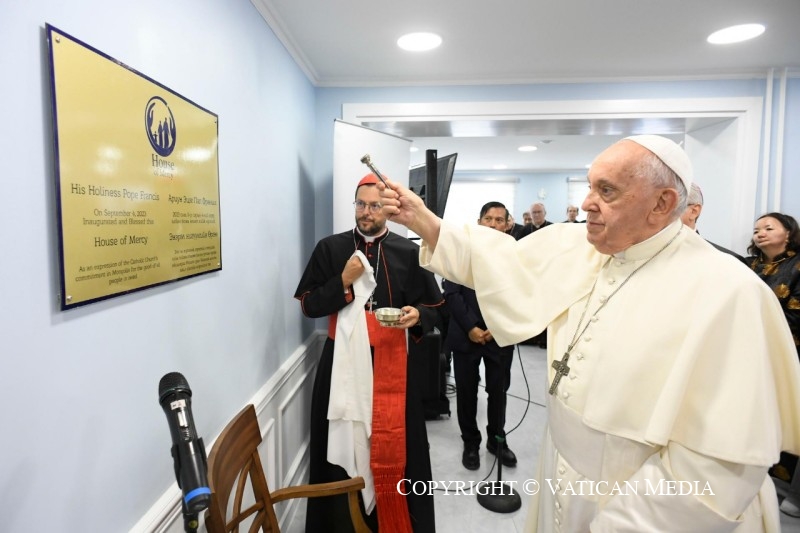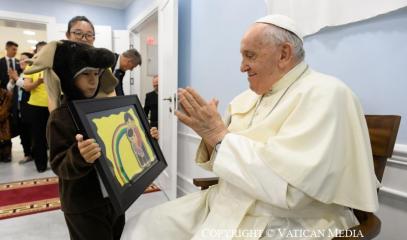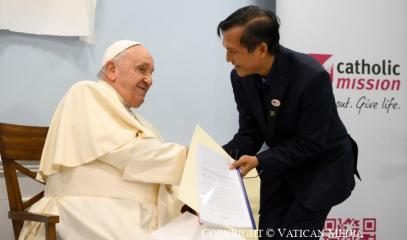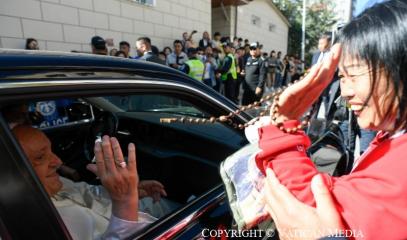Pope: healthcare and education, not weapons, measure the progress of a nation
Before departing Ulaanbaatar, the pontiff blessed the House of Mercy where Mongolia’s small Church will welcome the marginalised. This will be the legacy of the pope’s historic visit and provide an opportunity to “reject certain myths” about charitable work. Christians do not engage in social outreach to proselytise; “only love can overcome selfishness and keep this world going.”
Ulaanbaatar (AsiaNews) – Francis bid farewell to the country of the steppes and is already on his way back to Italy. Before ending his apostolic journey to Mongolia, he addressed a new message to the whole world about who is big and who is small in caring for others.
“The true progress of a nation is not gauged by economic wealth, much less by investment in the illusory power of armaments, but by its ability to provide for the health, education and integral development of its people,” he said.
The pontiff delivered his message at the inauguration of the House of Mercy, which will play a role in the daily life of Mongolia’s small Church long after the end of the papal visit.
The facility is designed for the marginalised in society, the: homeless (in a country where winters are rigid), the poor, women and children, migrants.
“Charity is a fundamental element of the Church’s identity,” Francis said before blessing the facility. This is what the Acts of the Apostles say about the first Christian community, but it is also the story of the small Catholic flock in Mongolia.
“From the time of their arrival in Ulaanbaatar in the 1990s, the first missionaries immediately sensed a summons to works of charity,” Francis explained. This “led them to care for abandoned children, our homeless brothers and sisters, the sick, the disabled, prisoners and all those who, amid suffering, sought their care.”
This followed a request by the Mongolian government of the time for Catholic missionaries to help the country cope with a number of social emergencies that emerged during the transition from the communist regime.
In addition to many ongoing initiatives undertaken in recent years, for Mongolian Catholics the new House of Mercy marks a qualitative change.
It no longer embodies one reality, but “it is the particular Church that carries out the work, coordinating the efforts of all the missionary groups, while preserving a clearly local identity, as an authentic expression of the Apostolic Prefecture as Christian The name, House of Mercy, says it all. “Those two words contain a definition of the Church, which is called to be a home where all are welcome and can experience a higher love that stirs and moves the heart: the tender and provident love of the Father, who wants us to be brothers and sisters in his house.”
After learning in the past few days so much about Mongolia’s small Church, such a place highlights its generosity, which “unburdens the soul, heals the wounds of the heart, brings us closer to God, becomes a source of joy, and keeps us young inside,” Francis said.
“In this country so full of young people, volunteer work can be a decisive path towards personal and societal growth.” Indeed, the House of Mercy offers all Mongolians “a ‘training ground’ that is always open, where you can exercise your desires for good and train your hearts.”
Dispelling some false myths about charity, the pope explained that wealthy people are not the only ones who engage in volunteering. In reality, it is “almost always,” he said, “people of modest means who choose to devote their time, skills and generosity to caring for others.”
A second myth is that the social works of the Catholic Church are meant to get people “to join up”. “No! The Church does not go forward by proselytism, it goes forward by attraction,” he stressed.
In fact, the pope sees the “House of Mercy as a place where people of different creeds, and non-believers as well, can join efforts with local Catholics in order to offer compassionate assistance to our many brothers and sisters in the one human family.”
As for a third myth, according to which charity is just another business, Francis said: “Certainly, charity demands professionalism, but charitable works should not turn into businesses. Rather, they should retain their freshness as works of charity where those in need can find people ready to listen to them with compassion, regardless of whatever pay they may receive.”
Ultimately, “only love can overcome selfishness and keep this world going,” Francis said. To prove this point, he cited Mother Teresa.
To a journalist, who saw her bent over treating a sick person, and said that he would not do what she was doing for a million dollars, the saint of Kolkata replied: “I wouldn’t do it for a million dollars either. I do it for the love of God!”
In saying what she said, she expressed the same generosity of spirit that the House of Mercy seeks to embody in Ulaanbaatar.










.png)










